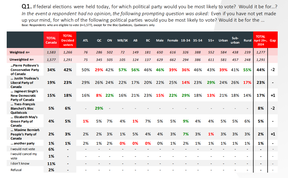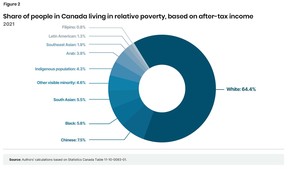It’s happening despite little to no Quebec-centric pandering from Conservative Leader Pierre Poilievre

Article content
First Reading is a daily newsletter keeping you posted on the travails of Canadian politicos, all curated by the National Post’s own Tristin Hopper. To get an early version sent directly to your inbox, sign up here.
TOP STORY
For one of the first times in nearly 40 years, a poll has emerged showing the Conservative party as a possible contender in Quebec.
While the province is still poised to be swept by the Bloc Québécois in the next federal election, it’s a sign that one of Canada’s last remaining anti-Conservative voting blocs may be softening.
A new Leger poll found that the Conservatives are tied for first place in Quebec with the Bloc Québécois, with both parties polling at 29 per cent support.

The Liberals, in turn, have dropped to third place with 26 per cent.
It’s not only one of the best-ever Quebec showings for the Conservatives, but it’s one of the only times that they’ve polled better than the Liberals.
To be sure, the Conservatives are still performing horribly in Quebec compared with the rest of the country. In every other major province, the Tories are either capturing a majority of the popular vote, or they have a 20-point lead.
But being tied for first place is a near-miraculous result given that the entire history of the modern Conservative Party of Canada has seen it brutally rejected by Quebecers.
Advertisement 2
Article content
The Conservative party has contested seven federal elections since its founding in 2003. In each one, the party was lucky to score third place in Quebec, both in terms of popular vote or seat count.
All of those election campaigns inevitably featured media speculations about a “Conservative breakthrough” in Quebec. Since 2003, in fact, the phrase “Conservative breakthrough in Quebec” has appeared in a Canadian news article more than 40 times.
But every single time, when voting day came around, the Conservatives were once again humiliated in Quebec. When former Conservative leader Stephen Harper captured a majority government in 2011, he won just five of Quebec’s 75 seats. When the Conservatives were endorsed by Quebec Premier François Legault in 2021, they won just 10 of 78 seats.
And this pattern has generally been repeating ever since the 1960s.
In federal elections that haven’t involved Brian Mulroney, Quebec has traditionally been a place where federal conservative parties go to die.
Quebec never elected a single MP from the Reform party or Canadian Alliance, the right-wing populist parties that formed the core of the modern Conservatives.
Article content
Advertisement 3
Article content
And the province spent whole decades in which only one or two ridings were held by the Progressive Conservatives. In 1980 — the last federal election contested by Pierre Trudeau — the final Quebec seat count was 74 for the Liberals, and one for the PCs. And even then, Progressive Conservative candidate Roch La Salle only held onto his rural riding of Joliette by 384 votes.
The only exception, as mentioned, was Mulroney, who swept Quebec’s seats in both 1984 and 1988, before much of his Quebec wing spun off to form the Bloc Québecois.
Although Conservative party leader Pierre Poilievre speaks the best French of a Conservative party leader since the formation of the modern party (albeit with an Alberta accent), the irony is that he’s seeing massive gains in Quebec despite doing very little to woo Quebecers in particular.
Recommended from Editorial
One of his only real Quebec-specific policy promises, in fact, has been to spare Radio-Canada even as he defunds its English equivalent, the CBC.
Advertisement 4
Article content
It was in a January interview with Radio-Canada that Poilievre explained his Quebec strategy as treating Quebecers as if they “have the same preoccupations as other Canadians.”
If the strategy is working, it helps that Quebec is only now being sidelined by many of the same economic and social woes that have characterized the rest of Canada’s experience of the latter years of the Trudeau government. This is particularly true of housing affordability, an issue to which Quebec used to be relatively immune.
Even with this week’s new Leger results, Quebec remains one of the only Canadian voting blocs that hasn’t dramatically turned towards the Conservatives in the last year.
In recent months, polls have progressively shown the party capturing solid pluralities in demographics that traditionally had very little to do with them, including young people, women and union members.
IN OTHER NEWS
Death threats against MPs have risen about 800 per cent since 2019, prompting the House of Commons’ sergeant-at-arms to counsel Parliamentarians to keep their office doors locked and avoid in-person meetings. “If an appointment with a constituent is necessary, Members or their employees should consider virtual meetings for the foreseeable future,” reads a memo obtained by the National Post.
Advertisement 5
Article content

The federal government handed out $400 million in bonuses in the last fiscal year, according to a new tabulation completed by the Canadian Taxpayers Federation. That figure is divided almost equally between the bonuses paid to civil servants ($211 million) and the bonuses paid to employees of Crown corporations such as VIA Rail or CBC ($196 million). It’s the $14.9 million in CBC executive bonuses that have gotten the most attention of any of these, mostly because they were paid out even as the broadcaster laid off hundreds of employees and petitioned the federal government for more money. The position of CBC president Catherine Tait is that the bonuses represent “performance pay” built into existing employment contracts, and are thus not technically bonuses. The Canadian Taxpayers Federation’s position, meanwhile, is that the government is so terrible at almost everything right now that it’s weird that one per cent of federal spending is going to bonuses. “Bonuses are for when you do a good job, they shouldn’t be handed out like participation ribbons,” said Franco Terrazzano, the group’s federal director.
Advertisement 6
Article content
Prime Minister Justin Trudeau endorsed a controversial decision this week by France to invite Russian officials to commemorations marking the 80th anniversary of D-Day. “As we commemorate the victory over fascism and Nazism in World War Two, it’s important to recognize all the countries that were involved,” Trudeau told reporters, adding that he still had “extreme disagreement” with Russia’s attempt to destroy Ukraine. The obvious criticism of the position is that neither Russia nor the USSR participated in D-Day (and the invasion was partially justified as a means to check Russia’s penchant for subjugating European countries).
Get all of these insights and more into your inbox by signing up for the First Reading newsletter here.
Article content



إرسال تعليق